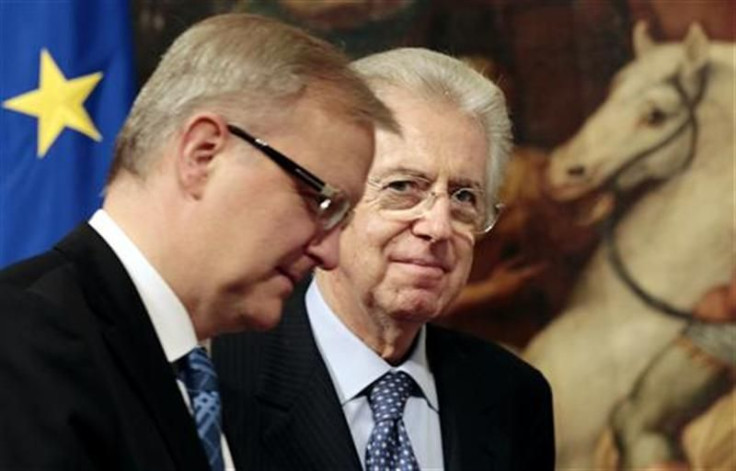Italy's Monti Seeks Broad Support for Debt-Crisis Measures

Italian Prime Minister Mario Monti met political-party leaders Saturday to solicit support for new measures designed to shore up public finances, help growth, and calm the debt crisis in the Eurozone's third-largest economy.
His cabinet is scheduled to approve the package of reforms Monday, a step widely seen as vital for re-establishing Italy's shattered credibility with financial markets after a series of unfulfilled promises by the previous government.
The plan will then be outlined during two news conferences -- one with foreign reporters -- and presented in both houses of parliament.
Italy has been at the center of Europe's debt crisis since yields on its 10-year bonds shot up to around 7 percent, similar to levels seen when countries such as Greece and Ireland were forced to seek bailouts.
Government sources familiar with the planned reforms say the mix of cuts and tax rises will total between 20 billion euros ($31.2 billion) and 25 billion euros ($38.9 billion) over the next two years, about one-half of which will be used to cut the budget deficit and help balance the budget by 2013 despite the economic downturn and rising borrowing costs.
The rest will free up resources to try to regenerate Italy's recession-bound economy.
Pier Ferdinando Casini, head of the centrist UDC party, said after meeting Monti that the measures would be severe but hopefully also fair.
When the doctor arrives, it's difficult to prescribe nice medicine. Medicine is always bitter, but sometimes inevitable to prevent the patient dying, he said at a news conference.
Angelino Alfano, secretary of former Prime Minister Silvio Berlusconi's PDL party, urged Monti to ensure the cuts did not fall heavily on people who have always shouldered the burden, and to show special consideration for families.
The plan is expected to include an increase in the retirement age for many workers, liberalize professional services, increase income tax in higher-income brackets, and introduce new taxes on private assets and luxury goods.
But it has not yet fully convinced the center-left Democratic Party's leader Pier Luigi Bersani, who said groups like low earners and pensioners needed greater protection and that measures to fight tax evasion were insufficient.
Fairness
Monti will meet unions and local authorities Sunday to try to reach a broad consensus on the plan. He has said fairness is one of the key priorities of his reforms, but unions are grumbling about possible pension and labor-market changes.
Susanna Camusso, secretary of Italy's biggest union CGIL, said she was struggling to see signs of equity in the plan, based on what she knew so far from reports, but would wait until after speaking to Monti Sunday to make her judgment.
We are ready to support the right decisions, but also determined to oppose those we consider wrong, she said at a union meeting Saturday.
Monti will have to balance the competing needs of showing budget rigor while not choking growth, without which it will be impossible to reduce a debt mountain equivalent to 120 percent of gross domestic product.
Changes to pensions will be key in the new reform plan, with eligibility requirements toughened for so-called seniority pensions, which are based on a combination of workers' ages and the years for which they have paid contributions.
Programmed cuts to the national health-service budget are expected to be accelerated by one year, to reduce spending by 2.5 billion euros in 2012 and 5 billion euros in 2013, a local government source said.
A local housing tax may also be reintroduced, bringing in estimated revenue of at least 3.5 billion euros per year.
Other expected measures include further increases in value-added tax rates and a ban on cash transactions above 500 euros in an effort to tackle tax evasion.
(Editing by David Cowell and Ralph Gowling)
© Copyright Thomson Reuters 2024. All rights reserved.






















